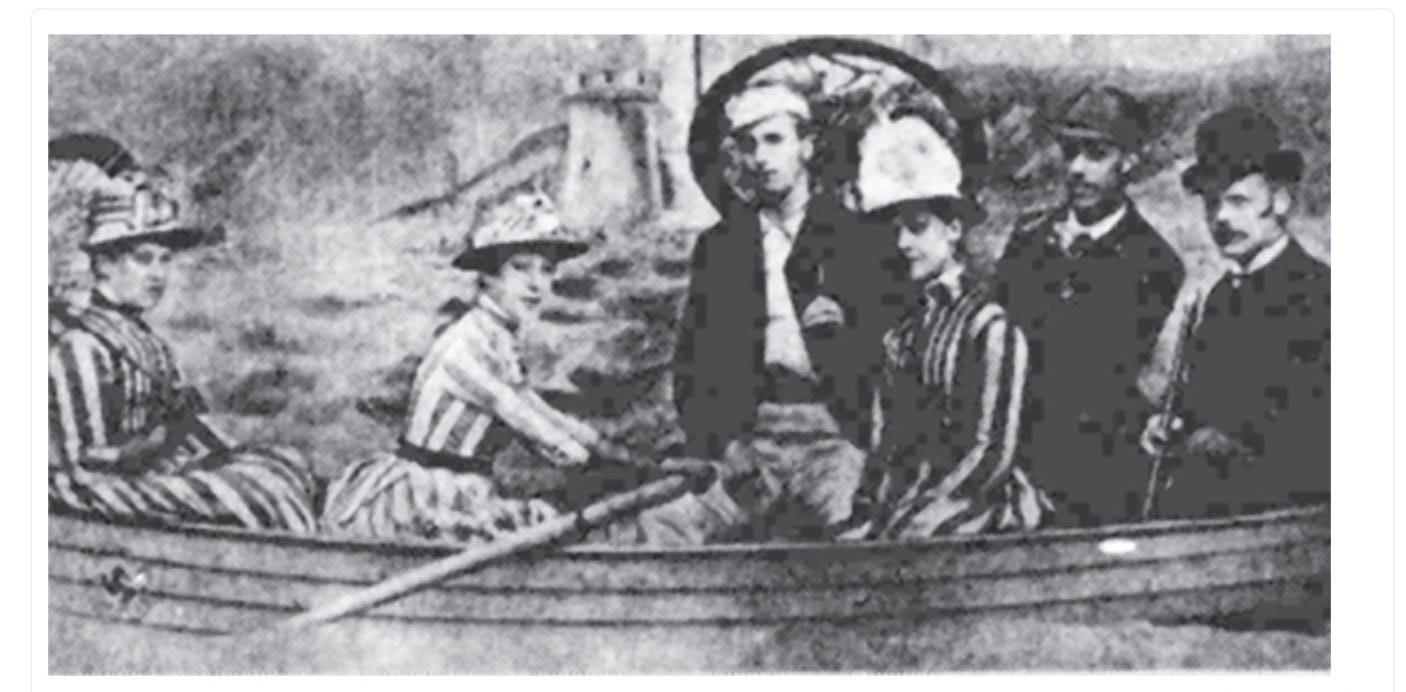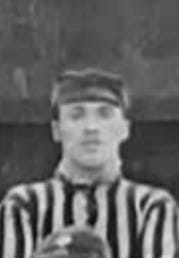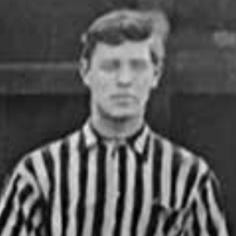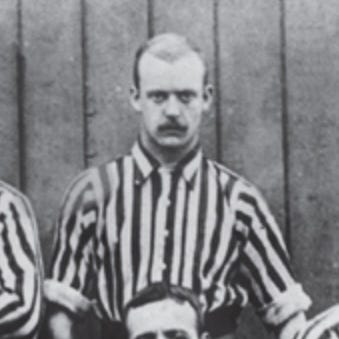Imagine an international match. England are playing – and their entire defence is comprised of players from Stoke.
You are not dreaming. This really happened on 5 March 1892, when England faced Ireland in Belfast. At the same time in Wrexham, Wales played… England.
This doubling up of England matches happened for three seasons, perhaps to ease fixture congestion in the early days of the Football League. It had the unintended consequence of unfashionable clubs seeing players called up for international duty as England needed to field two teams. In 1892, Bill Rowley, Tommy Clare and Alf Underwood of Stoke all benefitted.
Stoke’s international trio of Rowley, Clare and Underwood boating on holiday in the Isle of Man. Credit: Staffordshire Sentinel
Bill Rowley
William Rowley was born in Hanley in 1865. He played for Port Vale before signing for Stoke, causing a dramatic legal case when Vale claimed for damages. The judge who ruled in Port Vale’s favour described the feeling between the two clubs as a ‘deadly feud’.
Stoke played 2-3-5, as was typical for a team in the 1890s. Rowley played in goal, only missing two league games in the first two years of the Football League. Local lads Tommy Clare and Alf Underwood played as full backs, completing the defence.
Photo of Bill Rowley in Stoke kit, private collection
Rowley appeared twice in full England internationals, and three times in trial matches. His first cap came on 2 March 1889, when England beat Ireland 6-1 at Anfield, at that time Everton’s ground before the move to Goodison.
The following year Rowley was unused reserve goalkeeper for England, and 12 months later missed out on selection following a sternal fracture. He returned fit and well to play in Belfast in 1892. England scored twice, before Alf Underwood intentionally tripped Ireland’s inside left Sam Torrans within 12 yards of the goal line. The referee awarded the first penalty ever to be given against England. Bill Rowley saved it ‘in most brilliant fashion’ but was never again picked for international duty.
Tommy Clare
It would not have surprised many people if Bill Rowley never spoke to right back Tommy Clare, after the kicking Rowley received in one match from Clare. Rowley, then still a Vale player, was out for several months with broken ribs, although at the time he insisted he simply needed to get across to the players’ changing area in Stoke’s Copeland pub for a lie down – and a number of whiskies to help him recover.
Clare and Rowley soon made up and played together twice for England, along with numerous appearances in the same Stoke side. Before their second home match in the Football League in 1888, they cycled parallel to the pitch, an unusual warm-up for fans to witness. Tommy Clare was unable to keep a straight line and ended up with his bicycle on the grass. It made everyone laugh and relaxed the team who went on to win their first league game.
Photo of Tommy Clare in Stoke kit, private collection
Clare made four appearances for England, the first two of which came at the same time Rowley played in goal. Clare then appeared in England’s 6-0 victory over Wales on 13 March 1893, at Stoke’s Victoria Ground, with 10,000 fans in attendance.
The following year Tommy Clare travelled to Glasgow for England’s first match at Parkhead. Over 40,000 watched the 2-2 draw between Scotland and England. Part of a raised embankment for fans to stand on gave way and fell on two brothers. Both were severely injured. In England Expects, James Corbett wrote this said much about ‘the inability of the authorities to successfully manage large crowds.’
Alf Underwood
Alf Underwood, Stoke’s left back, worked as a flowerer, making clay flowers for decorative ware, from the age of 11 until the job went out of fashion two decades later, repeating the same work day after day. He took his chance when invited to play in Stoke’s reserve team and soon became ever-present in the full team, while still working as a flowerer. He didn’t miss a single match in the first two years of the Football League, looking impressive even as Stoke finished bottom both seasons and weren’t re-elected to the league.
The following season, 1890/91, he helped Stoke win the Alliance. He unexpectedly played in goal in a match against Bootle, conceding just once as Stoke won 2-1. Underwood was turning in performances that saw him selected for international duty and, on 7 March 1891, he made his England debut against Ireland. England won 6-1, at Molineux.
Alf Underwood. Credit: The Encyclopaedia of Stoke City, compiled by Tony Matthews
On 5 March 1892 Underwood earned his second and final cap, playing at left-back with Tommy Clare at right-back, and the slightly shorter Bill Rowley in goal – an England defence comprised entirely of Stoke players that years later would be considered one of the finest defences football ever had.
By 1908 Alf Underwood was in poor health and unable to work. Some of his old team set up a fund and decided to put on a benefit match. Harry Lockett, manager of Stoke when Underwood played for the Potters, was secretary of the fundraising committee and approached Fred Karno’s to be the opposition. The theatre company, who were bringing their popular ‘Football Match’ show featuring a certain Charlie Chaplin to Hanley, accepted.
Read more in
https://www.pitchpublishing.co.uk/shop/harry-lockett







